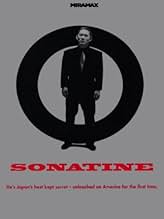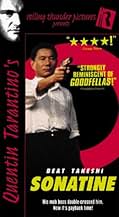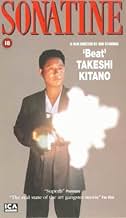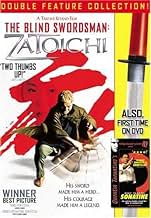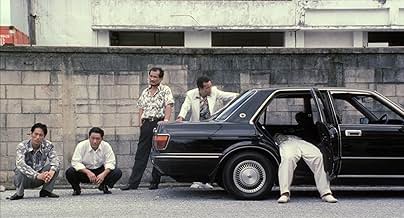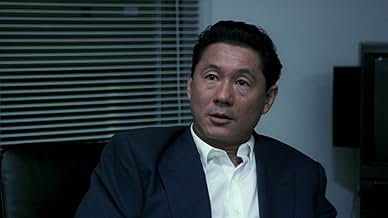Varios yakuza de Tokio son enviados a Okinawa para ayudar a poner fin a una guerra de bandas. Después, la guerra se intensifica y los errantes de Tokio deciden esconderse en la playa.Varios yakuza de Tokio son enviados a Okinawa para ayudar a poner fin a una guerra de bandas. Después, la guerra se intensifica y los errantes de Tokio deciden esconderse en la playa.Varios yakuza de Tokio son enviados a Okinawa para ayudar a poner fin a una guerra de bandas. Después, la guerra se intensifica y los errantes de Tokio deciden esconderse en la playa.
- Premios
- 4 premios ganados y 1 nominación en total
- Dirección
- Guionista
- Todo el elenco y el equipo
- Producción, taquilla y más en IMDbPro
Opiniones destacadas
I love how the only emotions Murakawa expresses are humor and nihilist apathy. The "sumo scene" is so delightfully out-of-place, while the ending simply leaves your mouth open. The warmth the characters show just makes it more hurtful when they meet such pathetic, low-key ends. I'm not an expert on Japanese society, but I see this film as a comment on the emptiness of a fear-filled culture of reservation, where it is more important to show restraint and respect than it is to continue living.
I'll still enjoy good ol' HK pistol operas, but I'll never see them quite the same again.
It begins with very unsentimentalized and nonglorified violence. People hit and kill each other and it isn't much different than toast popping out of the toaster. It is fast, moderately bloody, and there. Kitano doesn't seem to be interested in thrilling us with either the danger, grotesqueness, or thrill of violence--another, not clearly defined agenda is at work here.
At perhaps a third of the way into the film, it makes a sudden transition from this gangster life to a period of forced inactivity. I suspect this section, which is delightfully playful, is at the heart of this film.
A masterpiece of minimalism, 'Sonatine,' is a powerful, quiet film that speaks volumes without the need for words. Written and directed by Kitano, the film parodies the conventions of gangster films whilst playing into them, showing how facile and vacuous the majority of them are. The film strikes the perfect balance between introspection and sudden, whirlwind action, containing no unnecessary moments, stylizations or lines of dialogue. It is an economic, intelligently constructed movie that simmers steadily over its' runtime up to a terrific boil of violence, nihilism and existentialist depth.
'Sonatine' is oft compared to the films of Jean-Pierre Melville, in particular 'Le Samouraï.' Indeed, both films adopt a nihilistic attitude towards violence and feature long sequences containing limited dialogue. This allows the audience to experience the film's atmosphere and take themselves into the mind of the characters in a manner unfettered by extraneous noise. However, 'Sonatine' is less emotionally frigid than the work of Melville, and contains much humour; something rarely if ever found in Melville's movies. It is- on the whole- a far more entertaining cinematic experience; not to mention being a more rewarding intellectual one.
The film is shot by Katsumi Yanagishima, who worked on Kitano's previous efforts 'Boiling Point' and 'A Scene at the Sea.' Under Kitano's firm guidance, his cinematography is understated and naturalistic, producing haunting visuals that linger in the mind long after the credits have rolled. Kitano's films rarely if ever feature orthodox composition or framing of images, and the fresh, organic and off-beat approach to visuals in his movies is continuously striking and distinct. Yanagishima would go on to work on Kitano's next thirteen directorial features; though their collaboration on 'Sonatine' may still be their crowning achievement.
'Sonatine' features the work of another frequent collaborator of Kitano's: composer Joe Hisaishi. His score is beautiful, mournful and melodic; drifting through the film like a euphonious wind. There are few partnerships between composer and director as fruitful in cinema, perhaps only that of David Lynch and Angelo Badalamenti comes close. Hisaishi's work is muted and evocative, adding unquestionable power and depth to the proceedings. Hisaishi worked on seven of Kitano's films, and never once was his score anything other than mellifluous, pure and unobtrusive; as it is in 'Sonatine.'
Additionally, the film boasts a commanding central performance from Kitano as Murakawa. Few have a presence on screen as magnetic and quietly confident as Kitano. He performs with an unabashed ease and an unmatched stillness; seeming like a silent Cheshire cat without the grin, noting the proceedings around him with prescience and irony. His Murakawa is a composed man capable of extreme brutality, one tired of his existence and all too used to the grind and violence of life. Kitano fully becomes this character in so subtle a manner some might think he isn't doing anything at all; the highest compliment any actor can be paid.
His supporting cast features many talented performers working at the top of their games, most notably the great Susumu Terajima and the late Ren Ôsugi; both frequent collaborators of Kitano. Here, Terajima stars as Ken, one of Murakawa's underlings, delivering an assured performance of depth and wit. Ôsugi is equally outstanding, playing a smaller role as an associate of Murakawa's named Katagiri; though still impressing with his range and naturalness.
Takeshi Kitano's 'Sonatine' is a brilliant crime film of the ascetic variety that is unforgettable and unique. On every level, the movie impresses, from the excellent performances to Katsumi Yanagishima's striking visuals; and of course the stirring score from Joe Hisaishi. It is- for lack of a better term- the thinking man's crime film, as it contains moments of profundity and silence that would no doubt put many off or leave them clamoring for more action. In short, 'Sonatine' is a memorable, mature masterpiece of minimalism from an original, incomparable auteur. If you haven't seen it before, watch it now; 'Sonatine' is not to be missed.
In my opinion either you love this film or you hate it, there is no in between, since its so different from the standard or even great gangster movies of our time . I for myself was mesmerized by its artistic beauty, its compelling acting and its wonderful soundtrack.
By now i have seen Hanabi and all the other Kitano movies, but this remains the best to me..
¿Sabías que…?
- TriviaThe title Sonatine comes from the musical term sonatina. Kitano said that when learning the piano, when the learner gets to sonatinas they have to decide where they want to go, whether it is to classical, jazz or popular music; marking the point of crucial decision making. This refers to the character Murakawa in the film.
- Citas
Miyuki: You're tough. I love tough guys.
Aniki Murakawa: I wouldn't carry a gun if I were tough.
Miyuki: You can shoot without a second thought.
Aniki Murakawa: I shoot fast because I get scared fast.
Miyuki: But you're not afraid of dying, are you?
Aniki Murakawa: When you're scared all the time, you reach a point when you wish you were dead.
- Créditos curiososAt the end of the closing credits, various shots of the beach that were taken a year or so later, are included.
- ConexionesFeatured in Century of Cinema: Nihon eiga no hyaku nen (1995)
Selecciones populares
- How long is Sonatine?Con tecnología de Alexa
Detalles
Taquilla
- Total en EE. UU. y Canadá
- USD 58,834
- Fin de semana de estreno en EE. UU. y Canadá
- USD 17,527
- 12 abr 1998
- Total a nivel mundial
- USD 58,834
Contribuir a esta página



